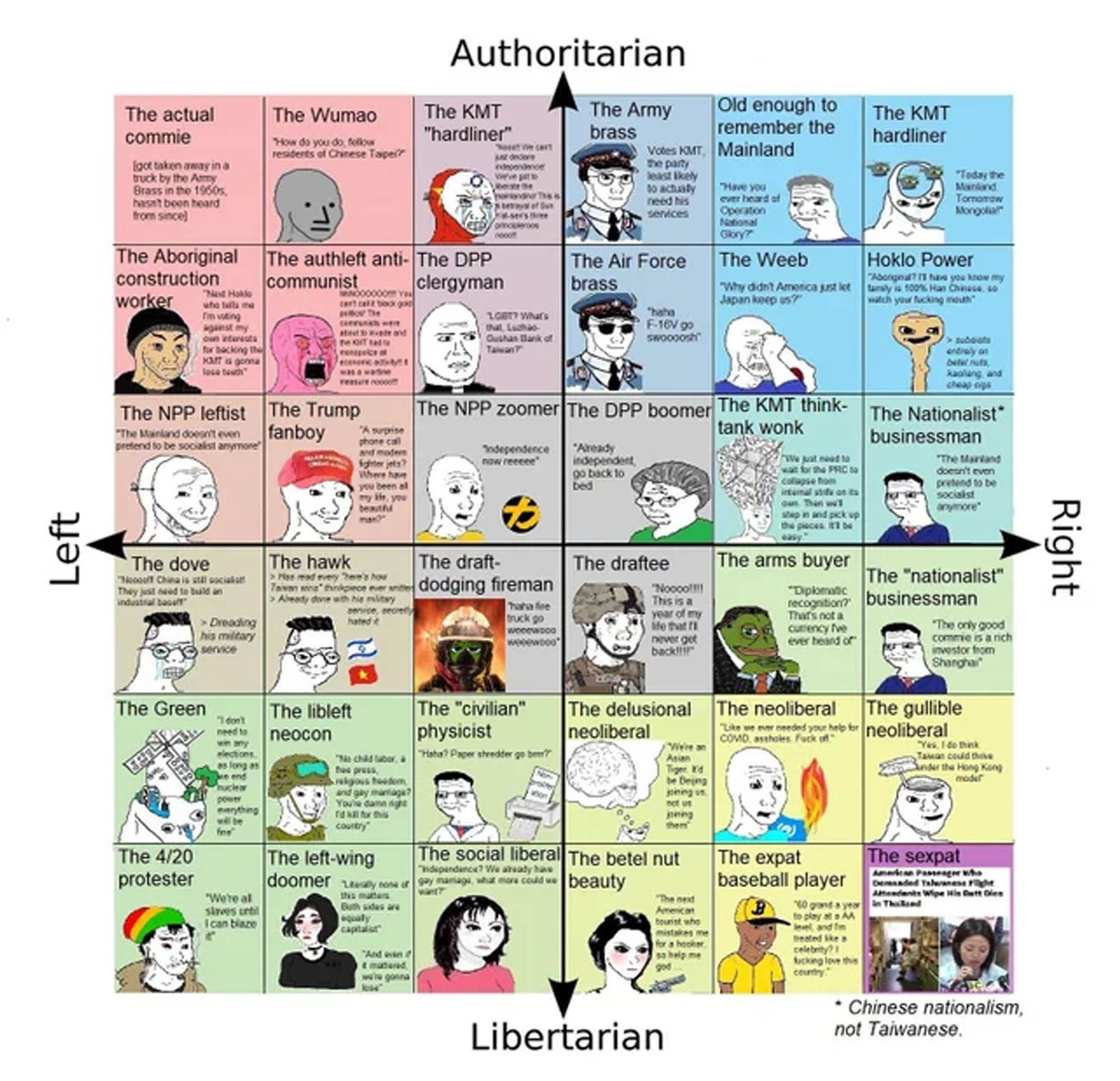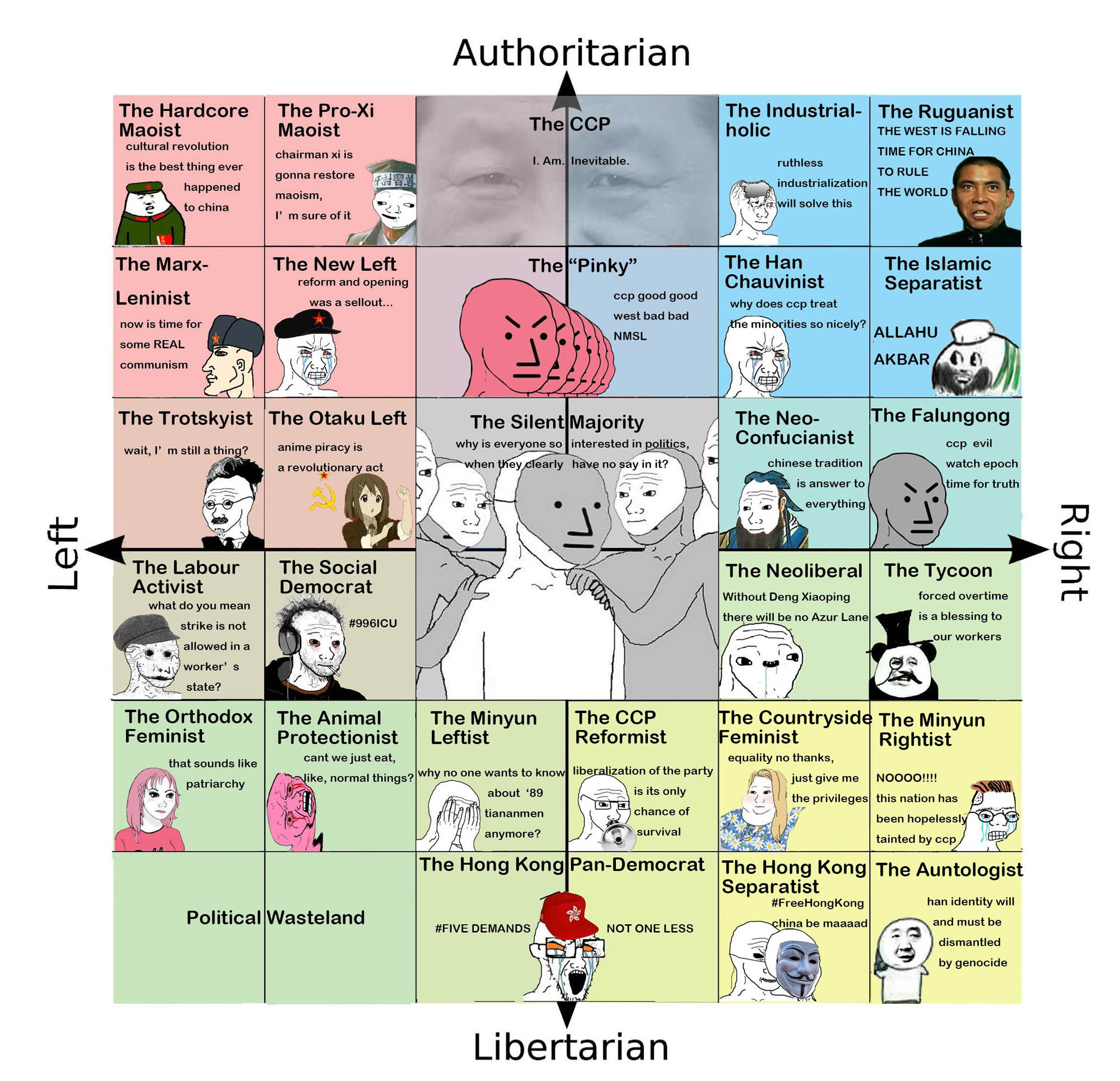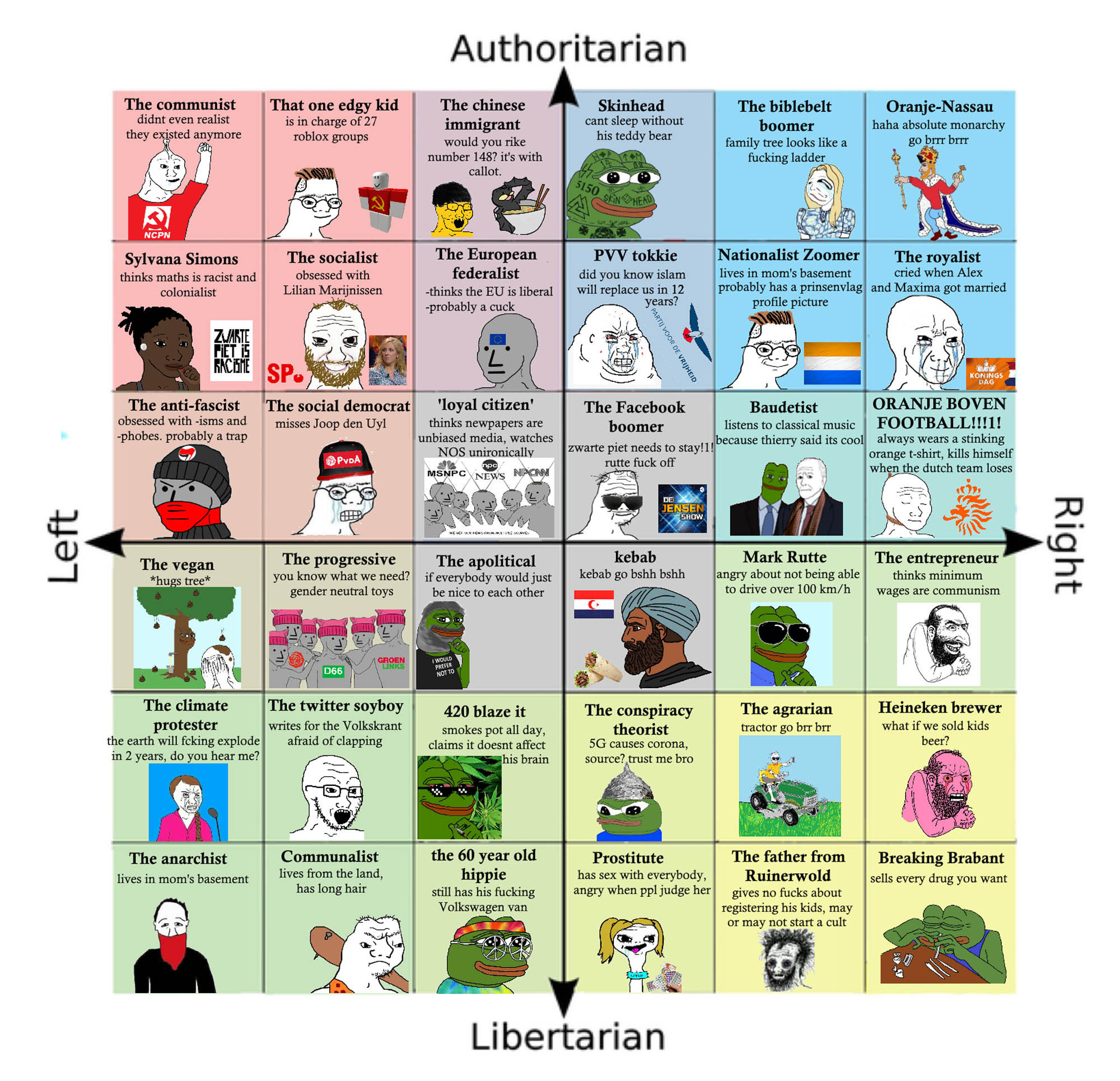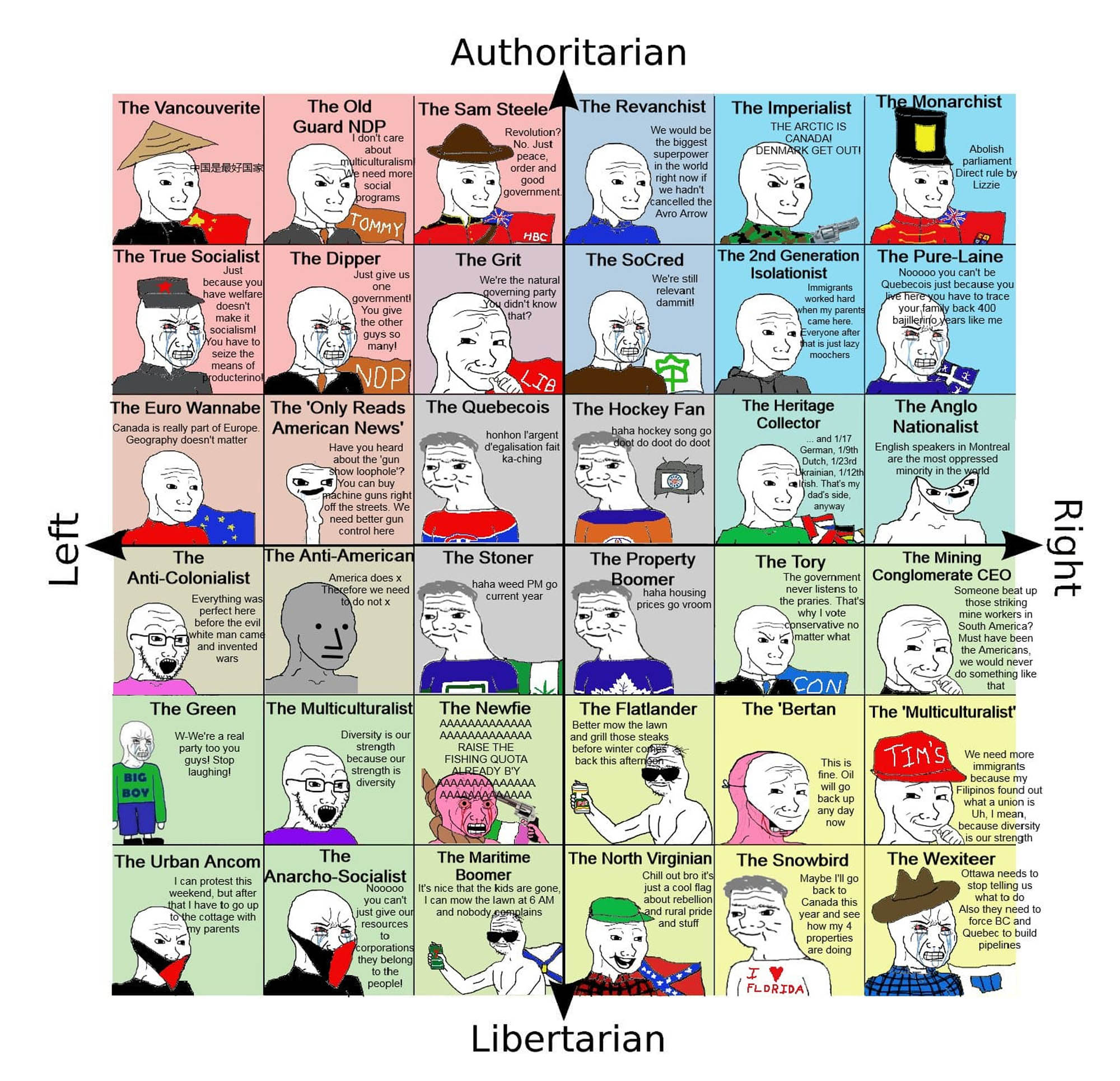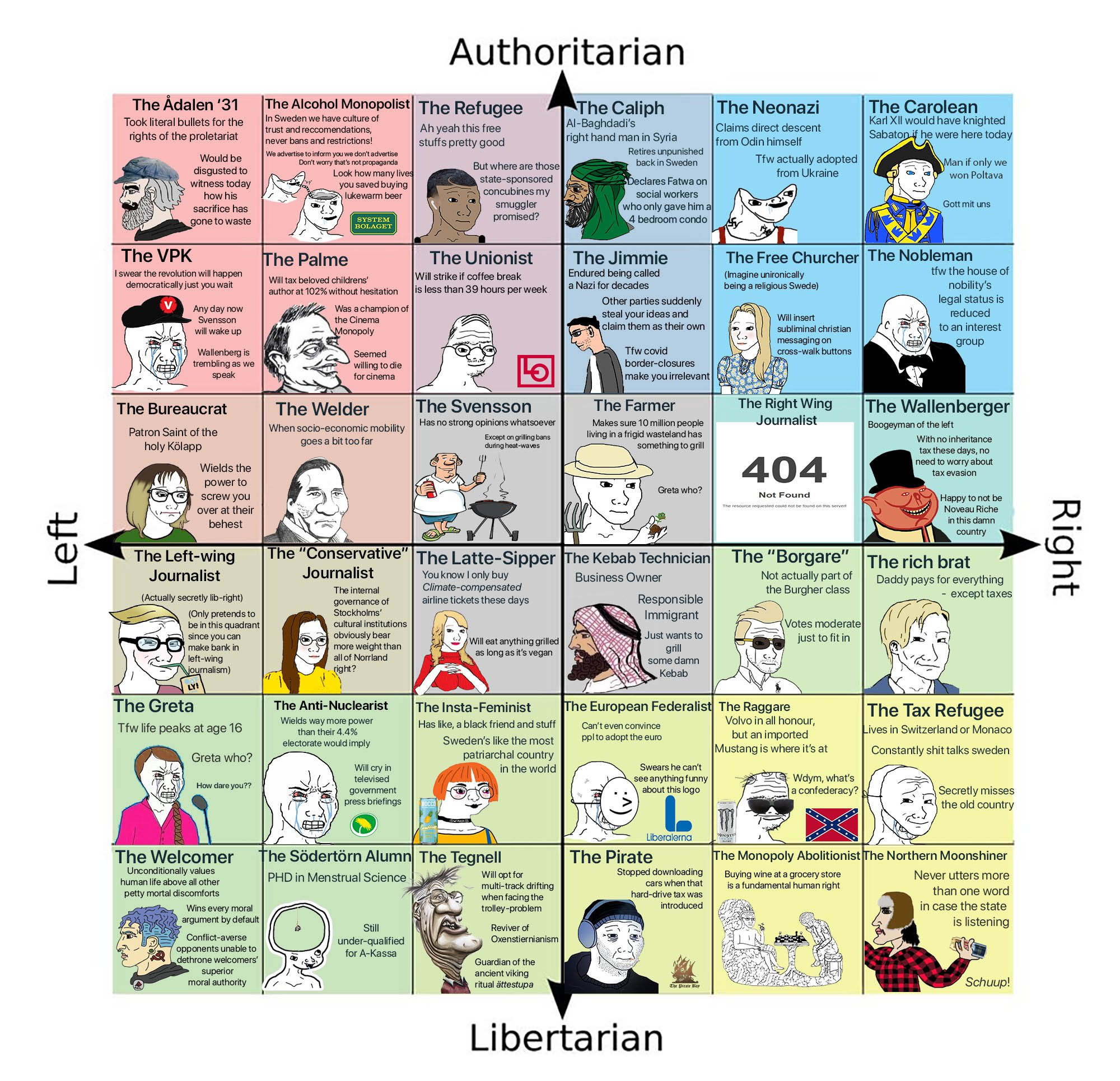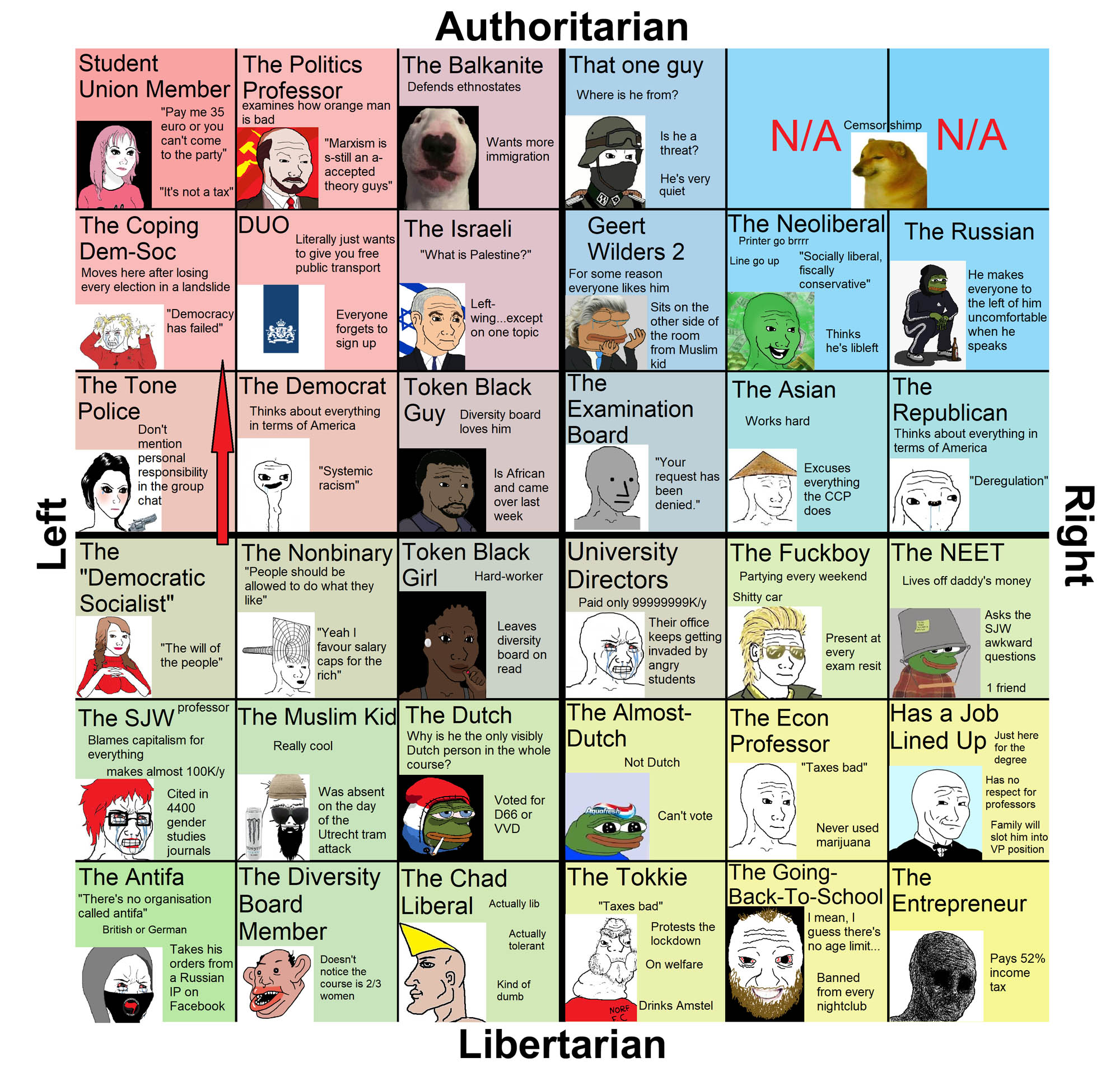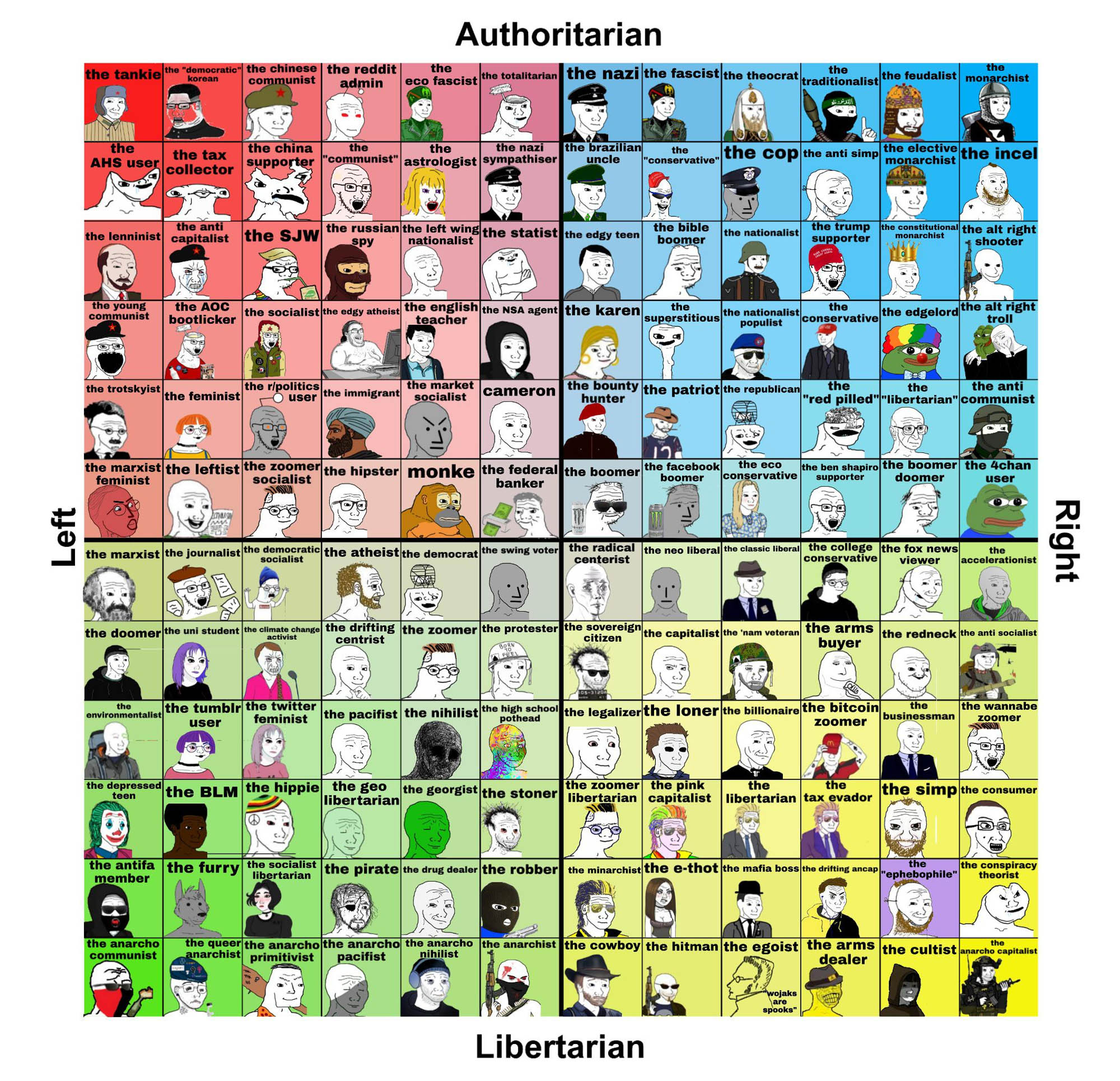
WEDNESDAY, JAN 20, 2021: NOTE TO FILE

Environmentalism without Environmentalists
Depoliticizing environmental issues
Eric Lee, A-SOCIATED PRESS
TOPICS: INFORMATION, FROM THE WIRES, SYSTEM
Abstract: For over fifty years humanity has been warned that the Great Acceleration (period starting 1712-1950) has an outcome that most people living through it (posterity passing through the coming bottleneck) will likely find lamentable (always have in prior dissolutions, e.g. ends of empire). If a sustainable maximum human population is 500 million, then we went into overshoot about 1650. If the carrying capacity for modern techno-industrial humans is 2,000 million, then we went into overshoot in 1927. With the possible exception of a few centenarians, we are all of the overshoot ones 2-15 generations into our pre-climax overshoot phase (descent will not take as long). Despite 50 years of environmental activism, from protest to armed and lethal resistance, the pace of planetary destruction has not slowed significantly. Rivers rarely catch on fire, and the SYSTEM (socio-political economic) switched from using a lot of CFCs to comparable chemicals (because while some lost money, others made more), and many fine words have been agreed to and accords signed, but otherwise the pace of planetary destruction has.... What if environmentalists are not only not part of any viable solution to environmental issues related to overshoot, but are central to enabling the growth hegemon to keep on keeping on such as by going along with consensus denial? Talking about population issues may not be politically viable, but that is evidence and reason enough to note that there are no viable political solutions.
COOS BAY (A-P) — Scientists have been warning humanity about its trajectory for fifty years and environmentalists have demanded change to moderate the adverse consequences on the public of growth (e.g. visible pollution, toxins in food and consumer items, preserving natural-like recreation areas for the public...). But for their efforts the society of growth and short-term prosperity would end sooner. Meanwhile, the pace of Anthropocene enthusiasm that is laying waste to a planetary life-support system goes on and will until it can't.
World scientists’ warning to humanity — Rex Weyler
The Fundamental Failure of Environmentalism — David Suzuki
Rex Weyler ends by noting: 'As an ecologist, I feel compelled to ask myself: if the last 50 years of environmental action, research, warnings, meetings, legislation, regulation, and public awareness has proven insufficient, despite our victories, then what else do we need to do? That question, and an integrated, rigorous, serious answer, needs to be a central theme of the next decade of environmentalism.'
On his 80th birthday scientist and environmental activist extraordinaire David Suzuki noted that despite some victories of the David Suzuki Foundation and other efforts by environmentalists over the decades, that meanwhile 'the pace of planetary destruction has not slowed'. Maybe there are no political solutions. Maybe any 'integrated, rigorous, serious answer' will be wholly outside humanity's (including political activists to full-on eco-fascist revolutionary environmentalist's) current Overton window of thinkable discourse—for a time—yet things change, 'this too, shall pass away'.
 Weyler's integrated, rigorous, serious answer to the human problematique in the next decade of environmentalism may be possible if the environmentalists stand down to make room for apolitical environmental thinking that is not belief-based. Environmentalists persist in believing in political solutions, doing more of what they've done for fifty years while expecting a different outcome. They are effectively part of the problematique and not any solutionatique. The political game is rigged. To play it is to lose. If born in Omelas, walk away.
Weyler's integrated, rigorous, serious answer to the human problematique in the next decade of environmentalism may be possible if the environmentalists stand down to make room for apolitical environmental thinking that is not belief-based. Environmentalists persist in believing in political solutions, doing more of what they've done for fifty years while expecting a different outcome. They are effectively part of the problematique and not any solutionatique. The political game is rigged. To play it is to lose. If born in Omelas, walk away.
An environmentalism that was not politically based could have a different outcome. Some environmentalists may be naturcentric in their thoughts, feelings, and perceptions, but working to get 51% of the population to agree to one or more proposed policies that are fundamentally abhorrent to the 49% (or even 15%) will not work if the minority has no recourse but to kill the eco-fascists and oppose unto death their anti-human policies (e.g. an effective limit on births). short-term self interest is to die or kill for per political animals.
Propose a rapid reduction in population (via birth-off to avoid die-off) and in modern techno-industrial societies (e.g. all cities) an order of magnitude reduction in consumption (and use of technology, e.g. cars, passenger planes) and imagine the outcome. Any chance of getting one percent of the vote? Or getting one or more current potentates to agree? Sorry, but the SYSTEM selects for its own failure and automatically thwarts all attempts to stop it. It incidentally presides over the greatest mass extinction event since the late Cretaceous, one that could rival that of the Permian.
A Systems Science Fiction Short
Let's say you've spent some decades reading the tea leaves of evidence and that you would rather know that modern techno-industrial civilization, the now global Euro-Sino Empire, is not remotely sustainable than believe that it is because we are exceptional and will soon decouple from nature as externality. If overshoot and collapse was your best-guess, you could not choose to work for and serve the growth hegemon, the Anthropocene (at least not with any enthusiasm). The condition of having no choice, of being obedient to the nature of things (as evidenced), is profoundly non-political and ultimately anti-political.
When the reindeer population of St. Matthew Island passed about 1,200 (carrying capacity) in 1957, they had no choice but to keep on keeping on, and when it climaxed at about 6,000, most had no choice but to die. But what if some fraction of one percent of the reindeer, when the population was at 5,000, had foresight intelligence and realized that continued growth was not viable, that overshoot was followed by collapse (at best descent) as usual, and that despite warnings, there would be no change in the growth/overshoot/collapse dynamic?

What if there was another island just barely within swimming distance? Leaving the prosperous life on the predator-free island that had allowed for seven doublings of their population would entail great effort and discomfort, perhaps even a ten percent mortality rate during the transition could be expected.
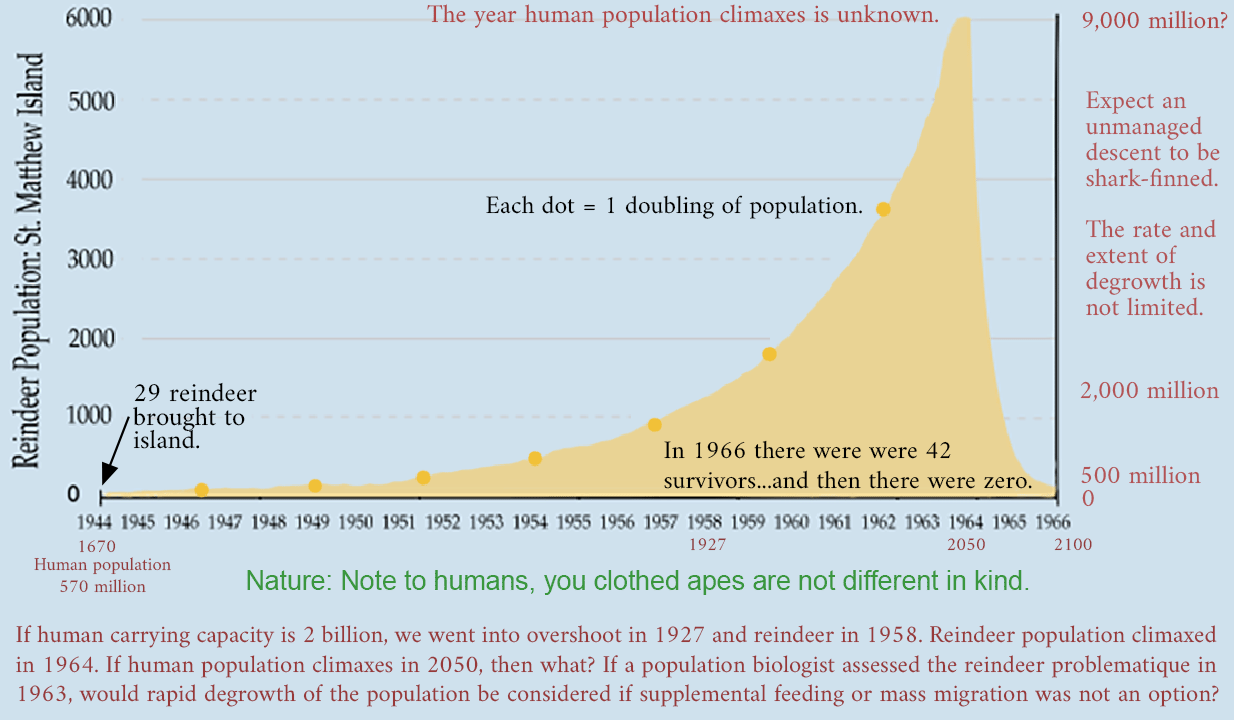
What if reindeer were as smart as humans? Could there have been a different outcome? What if beginning in 1950 some reindeer had given warnings of dissonant things to come if growth exceeded carrying capacity? What if years of environmental action, research, warnings, meetings, legislation, regulation, and public awareness building had proven insufficient to slow the pace of growth despite solemn agreements and signed accords?
What if 0.5 percent had enough foresight intelligence to decide to vote with their feet? The first few spend months telling all who would listen that they were leaving and why they were leaving. They explained that anyone going with them (all were invited) would agree to not repeat the pattern of overshoot and collapse.
The carrying capacity of the new island (or watershed management unit) would be assessed and the population would be maintained well below maximum to allow for survival during the 1000-year bad year that comes every thousand years or so (because it does). When the sustainable population was reached, only the death of one reindeer would allow the birth of another. The Mothers would decide who could calf and would prefer those having the clearest foresight intelligence and those who would be the best mothers. This would select for a viable outcome as the millennia pass.
Any failures to limit births (to calf without the blessing of the Mothers) would result in calficide. Anyone who could not understand why and agree had to stay where they were. And 99.4 percent did such that only 33 reindeer voted with their feet by swimming towards the distant island, and 29 made it. Without wolves on the island, with plenty of food, all understood that failure to live within limits would have a foreseeable, lamentable outcome for posterity. It was their understanding that determined the new 'rules of the game' (to manage procreation on an island for the taking and limit the taking) that delivered them from future overshoot and collapse.
Barely a millennium passed until calficide had become a distant memory. As the millennia passed, no one was eaten by wolves. No humans came to the island as the centuries passed and when some did, they were descendants of their kind who had voted with their feet to live different lives of enough within limits. They said they were from the United Federation of Watersheds and that this island was part of Nature's 80 percent and no humans would ever exploit it (if any humans threatened to, the Federation would take care of them). They explained what had happened on the other island—that there had been no survivors. The humans left without colonizing the island, unlike their ancestors would have, if only for a time, to turn reindeer into humans as inecolate reindeer had turned lichen into reindeer (for a time) on the other island.
Thanks to Federation transport, 29 pioneer reindeer volunteered to go back from where their recent ancestors came from and know the place for the first time. After 500 years of environmental restoration, the reindeer colonists lived on the environmental productivity of one-fifth of the island to leave room for the other animals, e.g. the voles and fox, living there. In accordance with the pulsing paradigm, their population fluctuated around a 240 average who lived prosperous lives of enough (that the island, not they, determined) as the millennia passed.
The Anthropocene was over, so they could (and humans could) live long and prosper.
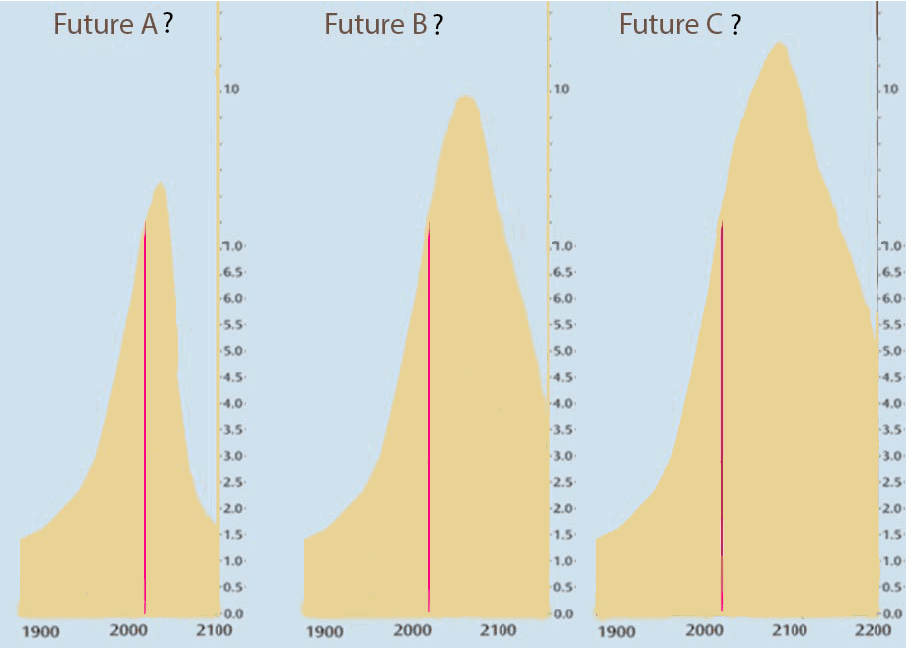
Subnote: But what if the reindeer were not merely as smart as humans, but actually like humans? As climax comes, factions form and fight over the remaining forage. The outcome is almost the same, except extinction may have been less likely. If 95 percent had died in battle, in antler fights to the death, less food reserves would have been eaten, so a remnant population of killer reindeer led by Adolf the Red Nosed Reindeer would have survived. Fighting to see who inherits the rubble, however, doesn't interest me. If it is Adolf or extinction, I would hope for....
What if Humans were Smarter than Reindeer?
This is a question of concern because if humans are to solve their problematique, as the reindeer did (if not exactly in the same way), to find a solutionatique that works, they will have to be smarter than the reindeer who had a simple, easy to understand problem (population overshoot) and solution (manage population). Humans are in a far more complicated fine mess. They have not one, but three wicked problems to find one solution for as all existential issues are interrelated.
As the reindeer had, humans have a Malthusian problem having Malthusian solutions if they fail to manage their numbers to remain well within carrying capacity to avoid Malthusian death during times of scarcity (e.g. starvation and conflict deaths) that will happen given that environmental productivity will vary (e.g. there will be thousand-year floods or droughts or storms, or climate change...)?
Unlike reindeer, humans depend on complex societies (compared to reindeer herds) of people living in band size (20-50) communities of trusted others having enough repeat interactions to select for trust and cooperation. With enough energy to support settled villages with high population density (>150) as enabled by agriculture or technology (e.g. red cedar canoes and horses with or without carts/chariots) from village size (>50) on up to cities of 1,000 to 10,000 between 7000 BCE - 3500 BCE, on up to cities of over 100,000 by 1300 BCE, complex societies too complex to be sustainable formed. These overdensity urban areas were empowered by agriculture and technology. By 100 BCE to 100 CE, Rome and Alexandria (wood empowered industrial society) exceeded 1,000,000 overdensitied humans (today fossil fuel empowered humans live in over 500 cities having more than 1 million residents, 113 in China alone).
Today, empowered by fossil fuels, there are 37 cities with populations over 10 million called megacities. Today's 'small city' size is over 100,000, which, prior to fossil-fueled times and slave empowered empires, would be called megacities and will be again. Without turning fossil fuels into food in various ways, including processing and transporting food stuff 1,500 miles on average to the end of consumer's forks, any settlement over 1,000 will again be a city, and historically all cities support humans at pathology inducing levels of overdensity and overstress such that functional behaviors are lost over an 8-12 generation period. So even if Malthusian issues are fully addressed, Calhounian ones are not. This is a problem the reindeer did not have.
With overcomplex societies comes social, political, religious hierarchy with elites ruling commoners. Chiefdoms self-organize and those who become warlords typically prosper, for a time, as empire builders. Commoners of empire, during its growth/conquest phase, also, to varying degrees, prosper and support the rise of empire. All citizens, elites and commoners, do not support the decline of empire and try to keep on keeping on. Increasingly large-scale warfare, up to recent world wars, is a problem the reindeer also didn't have to deal with. The reason humans do is that if a failing state (one failing to keep growing), from chiefdom size on up, can grow by expansion, it will. Some will expand/conquer just because they can.
Any community that manages its population size and lives cooperatively, in peace, in groups of viable size in balance with nature's productivity (all Malthusian and Calhounian concerns are history), will be a resource for the taking as viewed by any existing or would-be empire builders who practice the art of war.
For reindeer without predators to understand and live properly with the planet/island, they have to maintain their population under carrying capacity (to avoid famine) if predators, starvation, conflict/war, and/or pestilence cannot. If reindeer were as smart as humans and invented weapons able to kill all wolves (or humans) attempting to prey upon them, then they would need to properly manage their population numbers (or expand unsustainably by conquest for a time if possible) to avoid famine. But that is all they would need to do.
Humans need to change five dynamics to persist:
Malthusian: Energy/technology enabled growth in population numbers managed to maintain numbers well below maximum carrying capacity to avoid famine or scarcity induced conflict (murder, war, genocide) and pestilence/plague that oversized and overdensity populations select for. Assumed is that avoiding Malthusian deaths and injuries are to be avoided.
Calhounian: Avoid overdensity population dynamics with too few repeat interactions to select for trust, cooperation, and good will towards all members of the group (i.e. favor a viable band size human biology norm that selects for functional behaviors). Periodic gatherings, rendezvous, are the human biology norm and should be part of any design for an ecolate civilization/complex society. Only a complex society could resist predation by another complex society. Humans need to live in band-sized communities most of the time, but also form a large-scale, indeed global, organizational form to manage (define limits to) human demands on nature's resources.
Wittgensteinian: Our concept forming minds have created a fly bottle within which we are trapped. Our storytelling minds are bewitched by our belief in belief as enabled by language. We can understand or die. We fail to understand that there are no true stories told by fly buzz. Our models are not the system modeled. Understand or die.
Sunzian (The Art of War by Sunzi, 5th century BCE): Creating perfectly functional communities of perfectly functional humans fails if any group that for any reason fails to maintain a viable balance between their demands and Nature's resources can temporarily solve their longage of demand issues by conquest, war, exploitation, slavery, genocide and general taking, then some in such a condition will and their behavior, if rewarded, will be repeated and normalized. They will become empire builders and those living in peace will become resources for the taking. We will repeat the pattern of the last 10k years until we can't or evolve adaptations to chronic scarcity and conflict (e.g. three superpowers, perhaps called Eurasia, Eastasia, and Oceania, form a sustainable steady-state of warfare society).
Wellsian: In H.G. Wells' 1920 tome, The Outline of History, Wells noted: 'There may be tragic economic struggles, grim grapplings of race with race and class with class. We do not know; we cannot tell. These are unnecessary disasters, but they may be unavoidable disasters. Human history becomes more and more a race between education and catastrophe.... New falsities may arise and hold men in some unrighteous and fated scheme of order for a time, before they collapse amidst the misery and slaughter of generations.' By 1933, in The Shape of Things to Come, he noted humanity's pending failure, but offered a vision of a New Education system that, by 2106, could change the dominant narrative of the then global Indo-European empire building monetary culture. The Technical Alliance had formed in 1919 and in 1933, Wells failed to envision the failure to transition from the Old Education system to a viable one.
The Solutionatique
There is one problematique (overshoot, the wicked problem) composed of many problematiques (wicked problems), and failure to address the one is fatal. So there can be only one wicked solution that involves addressing all the solutionatiques.
Malthusian: Nature determines local carrying capacity. When population is at a viable level below carrying capacity, local residents disallow (the how is secondary) births exceeding deaths, i.e. one death allows for one birth. Slightly adjusting the ratio above 1:1 increases population to match a long-term trend towards increasing environmental productivity, while less than 1:1 lowers population to match any observable/expected trend towards decreasing environmental productivity (e.g. unfavorable. climate change). Lowering per capita consumption increases the viable population size, hence consumption per se, beyond needs, is antisocial, e.g. our consumer society.
Calhounian: Disallow raising children in urbanized overdensity settings to renormalize humanity (recover from behavioral sink). Renormalize living in band sized groups, which may take 8-12 generations to do, then experimentally assess increasing group size while assessing for loss of functional behaviors. We need to recover from the failed experiment in overdensity living (or go extinct) that empire building selects for. Cities could be inhabited by non-reproductive adults for a time. Some villages could be close enough to a city (e.g. a settlement of 10k people, perhaps a port city) to allow a reproductive parent to ride to the city one day, work several days, and bike back to the village to stay for a time before repeating the pattern. That this could work is a conjecture that may be in error. Those spending their entire adult lives within overstressed overdensity cities would not pass on acquired pathologies to posterity. Cities could only be occupied by families for a few days, e.g. during full moon, temporarily as gathering place to allow for benefits while minimizing the harmful effects that long-term overdensity living selects for. Benefits and harm can be measured and managed to keep harm from exceeding benefits.
Wittgensteinian: If our belief in belief were to falter, then our conceptual house of cards falls. Concepts that reference other concepts create a hall of mirrors within which nothing is apart from bewitched minds high on primate prattle, utterly disconnected from any what-is or may-be as great unknown that lies unexplored about them. We cannot know truth. We can iterate towards knowing, beginning with knowing what we don't know. As would-be memetic systems, universal humilitas is the medium for all messages. We know nothing apart from tautologies that tell us nothing about what-is. We can no more understand complex systems than a dog can understand calculus. Human extinction is one solution. Understand or die.
Sunzian: All communities naturally include guardian wannabes who could self-organize as militia, able to travel, that protect and serve their local community and assist nearby communities. They could also travel far if needed. If any community anywhere on the planet is attacked, an immune system-like response, first from those closest, is needed that sends a counter force that must prevent any long-term benefit to the attacker of any region occupied by humans or any region not managed by humans for humans, i.e. areas set aside for Nature (e.g. the 80% of land area not exploited by humans, so an island of reindeer, if exploited by some humans, would trigger a counter force able to draw upon global assistance as needed to end the exploitation). Humans normally living in small groups do not develop a control hierarchy of elites and commoners, nor engage in empire building. Eventually one would, but if there is no long-term pay-off, the behavior will not be selected for. Empire building will be denormalized.
Wellsian: Okay, an alternative to the Old Education system did not arise in the twentieth century to replace it by the twenty second century as Wells had hoped. Those who taught those who taught those who taught us who teach were/are products of it. The change needed to win our race with dissolution, the grim second law, may involve a paradigm shift at all levels, formal and informal, as Wells envisioned. The change will come one mind at a time—slowly, rapidly, or not at all. Our dynamic will collapse when our belief in it falters, sooner being better as Wells had hoped. But he wasn't smoking hopium. The Old Education system will fail. Such is the precondition for replacing it perhaps with a viable alternative that selects for viable alternatives to modern techno-industrial society. Wells identified the education system, formal and informal, as ground zero for non-chaotic change. Collapse the modern education system now, starting with neoclassical economics as pretend science, and replace/retire the political/religious ideologues to minimize cognitive pathology. How? One mind at a time, starting with your own. Wells was not a 'doomer' as he had foresight intelligence that enabled him to not know anything, unlike we think we do, being products of the Old Education system that selects against foresight and sapience.
If not reinforced via success, war and exploitation, Gaiacide, will be selected against. Any failure will select for the growth of empire and overexploitation of environmental resources, i.e. the planetary life-support system all life on Earth depends on. Many people can envision transitioning to living simple lives in small functional communities as endgame, but this can only be viable if empire building is not viable. This implies a global system of governance to manage any malignant human populations that have arisen. The empire-building dynamic currently dominates modern techno-industrial civilization, and even if wholly eliminated in some perfect future of peace and harmony, will arise again. Humans must create and learn to live in viable complex societies, despite overcomplexity/overdensity issues and harm, if only to disallow empire building, the conquest of other humans or Gaia, for short-term self interests, a dynamic that selects for its own long-term failure.
Any design for an ecolate civilization would have to address all existential issues and select for viable outcomes.
Subnote to file, 3-8-2021
This Quora post is exceptionally informative. All political animals should read it. It is about politics in Taiwan (population less than Texas but more than Florida), divided as usual, into two factions, the Greens (not environmentalists but democratic progressives) and the Blues (not so democratic who favor peace, unification with the mainland).
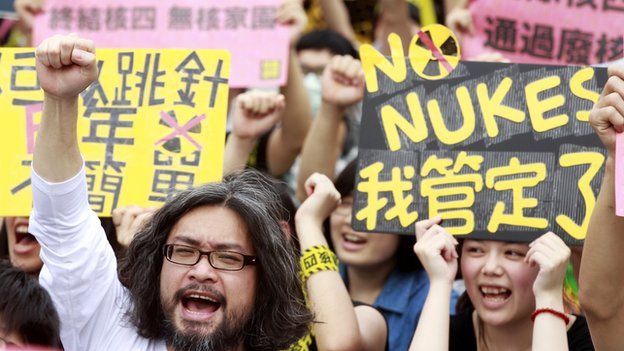 The Greens are sort of the progressive left-leaning faction, but they were Trump over Biden supporters due to Trump's China bashing. So from a Euro-American perspective, the labels 'right' and 'left' don't apply. Each faction is a mix of our right/left issues/groups.
The Greens are sort of the progressive left-leaning faction, but they were Trump over Biden supporters due to Trump's China bashing. So from a Euro-American perspective, the labels 'right' and 'left' don't apply. Each faction is a mix of our right/left issues/groups.
The only thing in common is factionalism. Their society (and all other democracies) tend to divide into two main factions as the system selects for this outcome. Each of the two dominant factions compete for special interest/subfaction support by adjusting their policies/appeals to serve manifold self interests.
This could be viewed, as I do, as a psycho-social pathology of complex society, especially of democracies, but Xi (who put the goal of an 'ecological civilization' into the CCP/China's constitution) also has to adjust policies/appeals to support the self interests of the many factions that make up complex societies (and Kim Jong-un does too as all presidents to absolute potentates whose merest word is law must). The Taiwan example makes it clear that the issues that concern citizens and/or leaders are not the thing, but for and against thinking in terms of short-term self interest is. In effect, all factions work to serve empire by pursuing self interest, the basis of the auto-organization of empire that democracy has proven best at serving.
Ending empire building is needed to end politics as usual/business as usual/modern techno-industrial society now global that is not remotely sustainable. As Sengcan noted in the 6th century, 'The struggle between "for" and "against" is the mind's worst disease' whether of individual minds or the collective consensus. A struggle to listen to Nature who has all the answers would be alternative.
 And, of course, there is a small third party for true social justice warriors, the Purple Coalition, for whom the Greens are not progressive enough (and there are the Yellows and Reds and other marginal parties). To simplify: the Blues are the wolves. The Greens are the wolves in sheep's clothing (who are pro-Trump), just like here except our wolves in sheep's clothing are anti-Trump. Conjecture: push a magic button and turn all Green (or Blue) identity citizens into Blues (or Greens so everyone is one color). Within a few years there would be two parties vying for power and if one 'wins' by 53 percent or more, their assent will be hailed as a landslide victory. Meanwhile the pace of planetary destruction will not slow.
And, of course, there is a small third party for true social justice warriors, the Purple Coalition, for whom the Greens are not progressive enough (and there are the Yellows and Reds and other marginal parties). To simplify: the Blues are the wolves. The Greens are the wolves in sheep's clothing (who are pro-Trump), just like here except our wolves in sheep's clothing are anti-Trump. Conjecture: push a magic button and turn all Green (or Blue) identity citizens into Blues (or Greens so everyone is one color). Within a few years there would be two parties vying for power and if one 'wins' by 53 percent or more, their assent will be hailed as a landslide victory. Meanwhile the pace of planetary destruction will not slow.
Political Compass (Pathology Matrix): Taiwan
Political Compass: China
Political Compass: Dutch
Political Compass: Canada
Political Compass: Sweden
Political Compass: University Campus
Political Compass: Popular Culture
'A pox on all their houses.'
Subnote to file, 12-7-2021
Some journalists keep trying, but there are constraints.
"The best response to this constellation of emergencies is to actively shrink the technosphere and radically reduce economic growth and energy spending. Our political class can’t imagine such a conversation." —Andrew Nikiforuk
The politicized class, including most voters, can't imagine the above vision of contracting the economy and per capita consumption, but essentially no modern techno-industrial human can imagine adding to the list the need to rapidly degrow the planet's populations of crops, livestock, pets, and humans. That the carrying capacity of the planet for non-fossil-fueled humans may be in a range of 7 to 35 million, depending on per capita consumption, is far outside essentially everyone's Overton window of thinkable thoughts. This failure may be humanity's greatest existential threat.
That overpopulation is an issue is mentionable, but not that rapid managed depopulation via birth-off needs to precede or be in lock-step with economic contraction. Of special interest is 'plastic speak' (Orwellian 'newspeak') which may be a universal affliction of modernity that prevents thinking outside one's consensus narrative (one's echo chamber), including the media and all who might contribute to it or be a talking-head on it..
I can imagine that if I was in an utterly private conversation with Andrew Nikiforuk, such that nothing he said could ever be repeated, that he would mostly nod and grimace. But no public intellectual, even one whose domain is Facebook or YouTube, can spread thoughts outside the consensus narrative of any group that would have them as a member. None can speak to the issue of one-off plague-phase overshoot and expect more than some sliver of one percent to do more than agree in private. This dynamic precludes thinking about or spreading even hypothetically real solutions, e.g. The Malta Solution.
Andrew Nikiforuk on Getting Real about Our Crises
WATCH: Andrew Nikiforuk’s Southam Lecture. Some attendees wondered where he finds hope. His answer: Hope is using every initiative ‘to restore the possibility of people making their own decisions.’
[Editor’s note: On Nov. 17, Andrew Nikiforuk, the highly awarded journalist, author and Tyee contributing editor gave the Southam Lecture at the University of Victoria. Over 1,000 people attended in person or online. You can view the recorded video above. Below, a bonus from Nikiforuk. He addresses questions some members of the audience sent his way.]
Two weeks ago, I gave a talk at the University of Victoria arguing that our morally bankrupt civilization is chasing dead ends when it comes to climate change and energy spending.
I argued that by focusing on emissions, we have failed to acknowledge economic and population growth as the primary driver of those emissions along with the unrestrained consumption of natural systems that support all life.
I added that people plus affluence plus technology make a deadly algorithm that is now paving our road to collective ruin.
As Ronald Wright noted in his book A Short History of Progress, civilization is a pyramid scheme that depends on cancerous rates of growth.
I also explained that many so-called green technologies including renewables, hydrogen and carbon capture and storage are not big solutions. Because they require rare earth minerals and fossil fuels for their production and maintenance, these technologies shift problems around.
In addition these green technologies cannot be scaled up in time to cut emissions or require too much energy to make any difference at all.
I also emphasized that our biggest problem is a self-augmenting, ever-expanding technosphere, which has but one rule: to grow at any cost and build technological artifacts that efficiently dominate human affairs and the biosphere. The technological imperium consumes energy and materials in order to replace all natural systems with artificial ones dependent on high energy inputs and unmanageable complexity.
This technological assault on the biosphere and our consciousness has greatly weakened our capacity to pay attention to what matters, let alone how to think. The result is a highly polarized and anxious society that can’t imagine its own collapse let alone the hazards of its own destructive thinking.
The best response to this constellation of emergencies is to actively shrink the technosphere and radically reduce economic growth and energy spending. Our political class can’t imagine such a conversation.
At the same time, communities and families must re-localize their lives, disconnect from the global machine and actively work to restore degraded ecosystems such as old-growth forests. Anyone who expects an “easy fix” or convenient set of solutions has spent too much time being conditioned by digital machines.
My cheerful talk generated scores of questions. There wasn’t time to answer them, so I selected five representative queries submitted via Zoom in the interest of keeping this heretical conversation going.
Growth in population tied to consumption is a big problem
Many listeners expressed disquiet about population growth being an essential part of the problem. “I am disappointed that once again Malthus has entered the room when the difference between per capita emissions for GHGs between the Global North and Global South are significant. Isn’t it how we live not how many of us there are?” asked one.
The real answer is uncomfortable. How we live and consume matters just as much as the growing density of our numbers combined with the proliferation of our machines that devour energy on our behalf. (Roads and cell phones all consume energy and materials too.) All three demographic issues are increasing at unsustainable rates and feed each other to propel more economic growth, more emissions and more fragility.
The world’s current population is 7.9 billion and grows by 80 million a year. It has slowed down in recent years because the affluent don’t need the energy of children as much as the poor. Even so, civilization will add another billion to the planet every dozen years. Redistributing energy wealth (and emissions) from the rich to the poor will not avert disaster if human populations don’t overall decline.
Our numbers also reflect a demographic anomaly that began with fossil fuels, a cheap energy source that served as Viagra for the species. Prior to our discovery of fossil fuels, the population of the planet never exceeded one billion. Our excessive numbers are purely a temporary artifact of cheap energy spending and all that it entails — everything from fertilizer to modern medicine.
Isn’t capitalism the real threat?
Many questions revolved around the nature of capitalism. “Wouldn’t it be more accurate to denounce the capitalist organization of technology rather than technology as such for problems like polarization and fragmentation?”
No, it would not. Technology emphasizes growth and concentrates power regardless of the ideology.
Capitalism, like socialism and communism, is simply a way to use energy to create technologies that structure society in homogeneous ways. Removing capitalism from the equation would not change the totalitarian nature of technology itself. Or the ability of technologies to colonize local cultures anywhere.
Every ideology on Earth, to date, has used technologies to strengthen their grip on power by enmeshing their citizens in complexity and reducing humanity to a series of efficiencies. All have supported digital infrastructure to monitor and survey their citizens. As the sociologist Jacques Ellul noted long ago ideologies don’t count in the face of technological imperative.
What comes next?
Many listeners asked if “there is a sequel to the energy-rich market economy?” I have no crystal ball but here is my response.
There will always be some kind of sequel and it is not written. But there is no replacement for cheap fossil fuels and their density and portability. They made our complex civilization what it is. As fossil fuel resources become ever more expensive and difficult to extract (a reality the media ignores), the “rich market economy” will experience more volatility, inequality, disruptions, corruption and inflation. It is rare for any civilization to manage an energy descent without violence let alone grace.
“Can you say more about the connection between the technosphere and totalitarian societies?” asked one listener. “How do you see connections between dictatorships and the technosphere?”
This is a subject for a much longer essay. The technosphere, by definition, offers only one system of thinking and operating (triumph of technique over all endeavors) and has been eroding human freedoms for decades. It simply creates dependents or inmates. Social influencers now tell its residents what to buy and how to behave. As such the technosphere has become an all-encompassing environment for citizens whether they be so-called democracies or totalitarian societies.
The major difference between the two is simply the degree to which techniques have been applied to give the state more total control over its citizens. In both democratic societies and totalitarian ones, technical elites actively mine citizens for data so that information can be used to engineer, monitor and survey the behavior of their anxious and unhappy citizens in a technological society. (You can’t live in a technological society without becoming an abstraction.) The Chinese state does not hide its intentions; the West still clings to its illusions of freedom.
The technosphere corrupts language
One listener wanted to know “more about the empty language” employed by the technosphere as I mentioned in my talk.
Just as the technosphere has replaced bird song with digital beeps, the technological imperium has increasingly replaced meaningful language with techno-speak.
A world dominated by reductionist and mechanistic thinking has produced its own Lego-like language completely divorced from natural reality. Decades ago the German linguist Uwe Poerksen called this new evolving language “plastic words.”
They include words like environment, process, organization, structure, development, identity and care. All can be effortlessly combined to convey bullshit: “the development of the environment with care is a process.” This modular language creates its own tyranny of meaningless expression.
Experts, technicians, politicians and futurists employ this plastic language to baffle, confuse and obfuscate. Poerksen notes these words are pregnant with money, lack historical dimension and refer to no local or special place. This language, divorced from all context, does to thinking what a bulldozer does to a forest. It flattens it.
Hope is not a pill you take in the morning or a crumb left at the table
Last but not least, many listeners asked how do we maintain hope in the face of so many emergencies, abuses and appalling political leadership?
“How do you get up in the morning?” typically asked one.
This frequent question confounds and puzzles me. My humble job as a journalist is not to peddle soft soap or cheerlead for ideologies and futurists. My job is not to manufacture hope let alone consent. I have achieved something small if I can help readers differentiate between what matters and what doesn’t and highlight the power implications in between.
Yet in a technological society most everyone seeks an easy, canned message pointing to a bright future. I cannot in good conscience tell anyone, let alone my own children, that the days ahead will be happy or bright ones. To everything there is a season and our civilization has now, step by step, entered a season of discord and chaos. History moves like life itself in a cycle of birth, life, death and renewal.
Jacques Ellul, who wrote prophetically about the inherent dangers of technological society, also addressed the need for authentic hope because it does not reside in the technosphere. The technosphere, a sterile prison, may promise to design your future with plastic words, but what it really offers is the antithesis of hope.
Ellul, a radical Christian, wrote much about hope and freedom. He noted that hope never abandons people who care about a place and are rooted outside the technosphere for they will always know what to do by their real connection to real things. He adds that hope cannot be divorced from the virtues of faith and love. Like all virtues they must be quietly lived, not daily signalled.
For Ellul, hope was a combination of vigilant expectation, prayer and realism. “Freedom is the ethical expression of the person who hopes,” he once wrote.
Hope is living fully in a place you care about and acting against the abuse of power every day. Hope, in other words, is using every initiative “to restore the possibility of people making their own decisions.”

